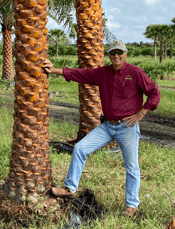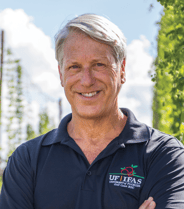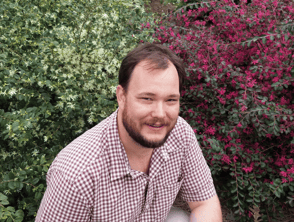Making A Mark
With Gardens Becoming So Integral in People's Lives in 2020, Anji Connell Explores How They Can Be Personalized Using Art to Create a Sense of...

Developments & Research in Academic Circles with Florida Grower John Conroy
 Industry Insights with John Conroy
Industry Insights with John Conroy
Success in business and life depends on many variables. Some we control, some we do not. Those that we have a greater measure of control over are called choices. Desirable ends are impacted by prudent choices based on the application of accurate information relevant to the path to success. Research has been essential in establishing foundations for action and providing pathways for advancement. I love predictable outcomes … enter research.
Meaningful research done by universities for the green industry hinges on several key factors:
Jack Rechcigl and Jeb Fields are two leaders in the green industry that were kind enough to share their thoughts with us on these important that impact the industry and many of us directly.
John: Where do research topics come from?
Jack: Most of the time, research topics that faculty work on come directly from our growers. Our faculty try to work on relevant issues facing the agricultural industry. It is important for our research faculty to work cooperatively with the people who have real world issues and targeted concerns. The process is best served by our faculty making site visits and keeping lines of communication open with growers and others in the industry. We also partner with various agricultural organizations to stay informed on critical issues they are facing. We have advisory committees made up of leaders from the various agricultural commodity groups, as well as government officials that help ensure we are working on relevant research issues facing the growers.
Jeb: I’m an extension specialist for the nursery industry so I get most of my ideas from growers. I like to keep my finger on the pulse, so I go visit them and attend their meetings and listen. I try to keep a balance between what I really want to do and how it can help the industry. If it’s not helping the growers and is not helping to better the industry, then what’s the point of being here, especially being in extension. I must keep that passion for what I do, so I think finding a good balance of what I like and that which is impactful and helps the industry is important.

John: Where does research funding typically come from?
Jack: Funding for research comes from a variety of sources. I’d say our growers associations and allied suppliers really fund most of our research. In my case, the Louisiana Nursery and Landscape Association (LNLA) is extremely supportive of our research and extension programming. There are federal and state level monies as well as private and nonprofit organizational funding. Industry stakeholders will often set aside money to fund critical research as well. For instance, FNGLA awards up to $5,000 for each committee-approved project proposal to supplement and extend current research projects. This format allows for FNGLA to pick and choose which proposals will most benefit its members and meet the priorities it has set for the year. All funding is very competitive, and faculty researchers must compete with others across the state and the nation to secure the monies. Many of the grants have very specific criteria attached and grant writers must get “creative” to meet the requirements of the grant as well as craft it to meet the needs of the problem being researched. It is important for organizations to be very active in lobbying to have funding earmarked for specific research. Without governmental funding, research is often very limited.
Jeb: I’d say our growers’ associations and our allied suppliers really fund most of our research. I’m at a research station so we get some funding through state and federal programs that helps us set up our small projects to maintain what’s going on at the farm, but most of it is externally funded. I have found from talking to smaller growers that they often don’t know that they can contact their extension research personnel for solutions to their problems. Recently, I was involved in an extensive survey of growers across the nation. We found that there was a feeling that, as researchers, we were often missing the mark regarding relevance. Growers want answers that are relevant to their needs and applicable solutions so that’s where our focus should lie.

John: How is personnel selected to research industry issues?
Jack: Personnel selection is really driven by the nature of the problem being addressed and matching the researcher’s skill set to the project. The University of Florida Institute of Food and Agricultural Sciences (IFAS) has a broad resource pool of scientists, economists, engineers, soil and water scientists, plant pathologists, entomologists, horticultural sciences, etc. What makes us such a powerful organization is our resources and ability to put interdisciplinary teams of experts together to address and help the industry’s needs.
Jeb: When I get a problem, I look to see if it’s in my area of expertise. I am really good with soils, water and fertilizer. If the issue is outside my skill set, such as plant disease or pest management, I reach out to my network of cooperative extension specialists around the country. Different extension agents have varying skill sets and expertise, and it’s my job to access that person.
.png?width=2124&height=1414&name=MOU%20Bahder%20Lab%20(2).png)
De-Fen Mou, postdoctoral researcher at UF/IFAS lab
John: How are the research findings disseminated to the industry?
Jack: We use many different media outlets to disseminate our research findings. Our faculty publish their findings in professional journals, as well as agricultural magazines, newsletters, websites, YouTube videos and other digital media outlets. We also have an online system called EDIS that has an endless array of topics that you can print as needed. Our faculty also present their findings at professional scientific meetings as well as local industry and commodity group meetings. The faculty also work very closely with the extension service where the extension faculty help to disseminate the information to our growers.
.png?width=245&height=366&name=MOU%20Bahder%20Lab%20(1).png) Jeb: The main way we disseminate take time away from their job to come visit my information is by publishing scientific articles research station. on our research. We also write extension publications, industry newsletters and fact John: The research agenda is driven by sheets, which are limited to a front page sheet perceived need, talent and funding. So, if you and are directly for the growers. We break it have issues of broad interest, it is within your down to a few key areas that we think are power to seek answers. Typically, research important for growers and their operation and only takes place when funding is provided, is then we post those on our website. We also relevant only when it addresses the needs of share our research at trade shows. Since industry and is effective when communicated COVID, my station has developed a website and we are now starting to post information on the site. I also run our ornamental trial gardens, so we try and put all the data and videos of these plants and how they're doing on the website as a type of virtual extension. YouTube videos and such are the new wave of extension especially since some people can’t take time away from their job to come visit my research station.
Jeb: The main way we disseminate take time away from their job to come visit my information is by publishing scientific articles research station. on our research. We also write extension publications, industry newsletters and fact John: The research agenda is driven by sheets, which are limited to a front page sheet perceived need, talent and funding. So, if you and are directly for the growers. We break it have issues of broad interest, it is within your down to a few key areas that we think are power to seek answers. Typically, research important for growers and their operation and only takes place when funding is provided, is then we post those on our website. We also relevant only when it addresses the needs of share our research at trade shows. Since industry and is effective when communicated COVID, my station has developed a website and we are now starting to post information on the site. I also run our ornamental trial gardens, so we try and put all the data and videos of these plants and how they're doing on the website as a type of virtual extension. YouTube videos and such are the new wave of extension especially since some people can’t take time away from their job to come visit my research station.
John: The research agenda is driven by perceived need, talent and funding. So, if you have issues of broad internet, it is within your power to seek answers. Typically, research only takes place when funding is provided, is relevant only when it addresses the needs of industry and its effective when communicated and subsequently implemented by users.
 Dr. Jack E. Rechcigl is a professor in the Soil and Water Science Department at the University of Florida, Director of the University of Florida Gulf Coast Research and Education Center and the Fort Lauderdale Research and Education Center. He has worked with the University of Florida for the past 35 years. Dr. Rechcigl is recognized nationally and internationally for his research on the beneficial uses of organic wastes and industrial by-products as fertilizers for agricultural crops.
Dr. Jack E. Rechcigl is a professor in the Soil and Water Science Department at the University of Florida, Director of the University of Florida Gulf Coast Research and Education Center and the Fort Lauderdale Research and Education Center. He has worked with the University of Florida for the past 35 years. Dr. Rechcigl is recognized nationally and internationally for his research on the beneficial uses of organic wastes and industrial by-products as fertilizers for agricultural crops.
 Dr. Jeb S. Fields is an assistant professor & extension specialist for Commercial Ornamental Horticulture with the Louisiana State University Agricultural Center. Dr. Fields serves as the assistant research coordinator for the Hammond Research Station, where he is also the director of the Hammond Trials and the chair for the Louisiana Super Plants. Dr. Fields’ primary research and extension focus is to support the nursery and greenhouse industry through engineering soilless substrate systems for increased resource efficiency.
Dr. Jeb S. Fields is an assistant professor & extension specialist for Commercial Ornamental Horticulture with the Louisiana State University Agricultural Center. Dr. Fields serves as the assistant research coordinator for the Hammond Research Station, where he is also the director of the Hammond Trials and the chair for the Louisiana Super Plants. Dr. Fields’ primary research and extension focus is to support the nursery and greenhouse industry through engineering soilless substrate systems for increased resource efficiency.

With Gardens Becoming So Integral in People's Lives in 2020, Anji Connell Explores How They Can Be Personalized Using Art to Create a Sense of...

Ryan Malone, Director of Maintenance at Malone’s Landscape in Washington, Talks Business Growth, Company Culture & Healthy Competition.
 Read More
Read More